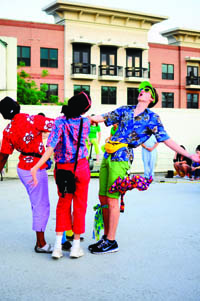Minors and Programs: Center for Creative Work
 From Internship to Thesis Award
From Internship to Thesis Award
by Kristen Flack
I have to admit, I signed up for the creative work (CW) minor two years ago because it sounded like it would be little work. Now I’ve come to realize that no other program could have been more challenging. My internship with Inprint, Houston’s literary nonprofit organization, was the first way the minor made a great impact on my studies. In my two years of work with Inprint, I have met writers like Salman Rushdie and W. S. Merwin, learned to write grants, and gained experience in marketing.
My coursework for the minor has been varied, allowing me to work with great professors both on campus, like Dr. John Harvey and Dean William Monroe, and off campus, like Houston blues scholar Roger Wood. Courses like Poetics and Performance gave me a vocabulary to analyze the arts, and the capstone course, Artists and Their Regions (AaTR), taught me the value of place when creating something new. Last fall, I presented about the AaTR experience with Megan Harrington and Dr. Harvey at the National Collegiate Honors Conference. Then, with Megan and Reyes Ramirez, I’ve been involved in founding the undergraduate literary journal The Aletheia, which gave me invaluable experience in publishing.
I completed my minor’s coursework with my senior honors thesis—The Dirty South: Personal Essays and Lyric Interludes—in which I wrote a collection of essays concerning my relationship with the South, my family, and my identity. Dr. Kimberly Meyer, a CCW and Honors professor with whom I had wanted to work for most of my time at the Honors College, directed my thesis. I know that the ideas from my collection—place, alienation, homecoming—came from the courses I took for the minor. I am thrilled that my thesis won the Outstanding Thesis Award, and I owe a great deal of its success to this program. All of these experiences have truly enriched me, not just as a student, but as a reader, writer, and person.
The Dionysia Experience
by Jana Trojanowski
I first learned about the creative work (CW) minor in Dr. John Harvey’s Human Situation discussion group, where he showed us the connections that art and culture have with the world around us. It was only my second semester in Honors, but I was hooked.
After signing up for the CW minor right away, I was part of the first Poetics and Performance class. We embarked on a journey into art and experience that taught me to let my art create itself. During the course, I created what I think is my best film so far, the short film Aegisthus: Story Untold, which gives poetic voice to a character in Greek history who had never been given more than a supporting role.
My experience with the Center for Creative Work was most enriched through the Dionysia, where I worked as production manager for Agamemnon and The Frogs, and submitted films for two Ekphrastic Arts Festivals.
The Dionysia was the ultimate culmination of a CCW experience: like everything in the CCW, we got involved and made it our own. Actors helped create and shape their characters. Students interacted with great works and the city. This year’s show brought the performances to two locations outside of the University—to Fitzgerald’s in the Heights and to the roof of Khon’s Bar in Midtown. Staging the show in these locations forced the cast and crew to be versatile and to interact with the world around us.
While the Dionysia experience is unique for each student, as production manager, I was intimately involved in the creative process, from assisting student actors to making the productions come to life with the design and creation of sets. For example, I assisted the Eleusinian Choros (shown above) in Frogs with creating their mystery ritual, which formed the basis for all their choreography and movement. I gained a much deeper knowledge of the works we were performing through interpretation and close readings, and came to understand the intricacies involved in such a major undertaking as we dealt with set design, location changes, budget concerns, and overall organization.
The CW minor has taught me to understand how art and monuments can be artistic representations of historical events. The way we understand history is directly affected by the reactions to and design of these artworks. As a perfect extension of this understanding and everything I’ve done in the CW, I’ll be studying the history of memory, dealing specifically with monuments, memorials, and memoirs, in an interdisciplinary graduate program in History and Culture at Drew University in the fall.